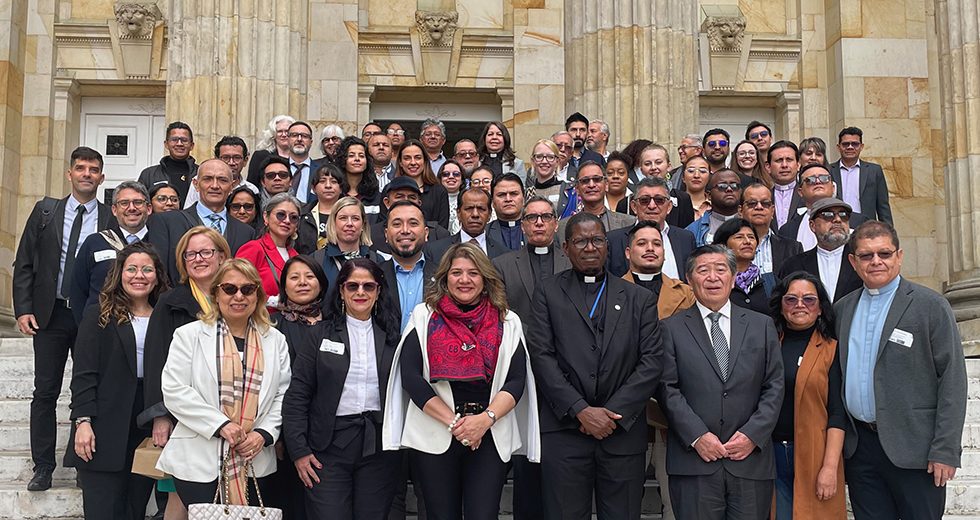Ecumenical group charts course for peace in Colombia
Posted on August 29, 2023 by Phil Tanis

An ecumenical meeting brought together church leaders from around the world in mid-August to map out the next steps for involvement in the reconciliation and peace process in Colombia.
“I think it is important when we think of peace, when we work for peace, to keep in mind that peace is something urgent in many contexts, especially in Colombia, where we were able to see the thirst people have for peace, that peace is not just a concept but a reality that people are living without,” said Muna Nassar, executive secretary for mission and advocacy of the World Communion of Reformed Churches (WCRC).
Organized by the Inter-Church Dialogue for Peace in Colombia (DiPaz), the gathering included representatives of the WCRC, World Council of Churches, Lutheran World Federation, and ACT Alliance, along with denominational representatives, including the Presbyterian Church of Colombia, Presbyterian Church (USA), and Presbyterian-Reformed Church in Cuba.
“The Presbyterian Church of Colombia’s commitment to the peace process and the boldness of that commitment inspires our Reformed family to engage with them not only in prayers and support but with many different forms of solidarity. We were, we are, and we will be committed to peace and justice for our brothers and sisters in Colombia as well as their people as long as they need us,” said Dora Arce Valentin, executive secretary of AIPRAL, the Latin American regional council of the WCRC.
“The importance of conducting peace and justice work ecumenically in Colombia can be significant, as it can leverage the strengths of various Christian traditions, provide a more comprehensive approach to complex issues, promote unity within the Christian community, offer a witness to the world, and foster learning and growth,” said Valdir Franca, area co-coordinator, Latin America and the Caribbean, for Presbyterian World Mission.
Eight years after the first forum that gave rise to DiPaz, the group met to analyze the current status of the dialogue and cessation of hostilities between the government and the guerrilla forces, as well as to deepen the experiences and lessons learned from the agreement under development between the Colombian government and the Revolutionary Armed Forces of Colombia (FARC).
The meeting included biblical-theological reflections, interpretations of the current situation, and analyses of different aspects of the instances of reparation and reconciliation that were accompanied by DiPaz and its member organizations. The group also traveled to a remote area under military occupation to witness on-the-ground realities.
“In the understanding of peace, it is important to keep justice in the center of the whole process, and being in Colombia and hearing from the local context about how peace has been a journey, a challenging one to many, have pushed the participants to discern and think about what the concrete action of the truth entails and how can we accompany this journey toward peace, a truthful, just peace,” said Nassar.
At the conclusion of the meeting, DiPaz was able to present its strategic plans for the next five years for review and response, which will continue its commitment to “a long-term peace agenda for Colombia, from the increase of socio-ecclesial capacities for peace and the accompaniment of communities of faith, collectives and communities that promote reconciliation processes, and the incidence in the formal processes of dialogue between the government and various armed actors.”
“The visit to Colombia to partake in the DiPaz ecumenical gathering was a crucial visit for the peace and reconciliation work that the WCRC has always been involved in,” said Nassar. “The WCRC has accompanied the peace process in coordination with AIPRAL, our member churches, and partners and will continue to do so.”
The WCRC’s peace work in Colombia is supported by a grant from Otto per Mille.
(AIPRAL contributed to this article. Image courtesy of WCC/Marcelo Schneider.)
 World Communion of Reformed Churches
World Communion of Reformed Churches